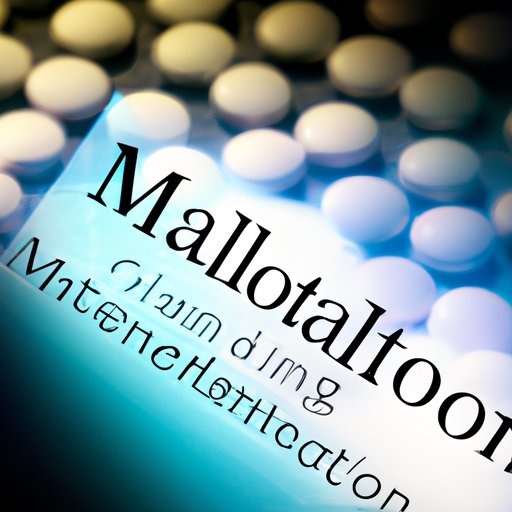
Introduction
Can melatonin get you high? With the increasing prevalence of recreational drug use among young people, the question has become more common. While melatonin is a natural and commonly used sleep aid, some individuals may be tempted to use it to achieve an altered state. However, doing so can be dangerous and lead to negative health effects. This article aims to explore the effects of melatonin on the body, potential risks and legal consequences of use, and provides alternatives for achieving an altered state for young people.
What is Melatonin and How Does it Affect the Body?
Melatonin is a hormone produced naturally within the body by the pineal gland. Its primary function is to regulate the sleep-wake cycle, also known as the circadian rhythm. Levels of melatonin increase in the evening, helping to induce sleep, and decrease in the morning, signaling the body to wake up.
In addition to regulating sleep, melatonin has several other potential benefits for the body, including reducing inflammation, boosting immune function, and regulating blood pressure and body temperature.
Dosage recommendations for melatonin vary depending on the individual and the intended use. Generally, doses between 0.5-5 mg are recommended to induce sleep, while higher doses may be used under medical supervision for certain conditions. However, it is important to note that taking too much melatonin can have negative side effects, such as dizziness, headaches, and nausea.
Can Melatonin be Used to Achieve a “High” or Altered State of Mind?
While melatonin has been used primarily as a sleep aid, there is limited potential for a “high” with its use. Some individuals may be tempted to use melatonin to achieve an altered state, similar to other recreational drugs such as cannabis or alcohol. However, the reality is that the effects of melatonin on the brain are not strong enough to create a significant high.
Melatonin affects the brain by interacting with receptors that are involved in regulating sleep and other bodily functions. These receptors are different than those targeted by recreational drugs, which are typically much stronger in their effects. While melatonin may cause some drowsiness or relaxation, it will not produce the intense effects desired by those seeking a high.
Personal anecdotes of recreational use of melatonin are limited, but some individuals may report experiencing mild euphoria or altered perception. However, these effects are likely due to the placebo effect or a combination of factors, rather than the direct effects of melatonin.
The Potential Dangers and Risks of Using Melatonin to Get High
While using melatonin to achieve a high may sound appealing, it can be dangerous and lead to negative health effects. One of the most significant risks of melatonin abuse is disruption of the body’s natural sleep-wake cycle. Overuse of melatonin can interfere with the body’s natural production of the hormone, leading to dependence or difficulty sleeping without it.
Additionally, taking high doses of melatonin can lead to negative side effects, such as headaches, nausea, and dizziness. Long-term use of melatonin has also been associated with decreased fertility and decreased bone density in some studies.
Alternatives to Using Melatonin for Recreational Purposes
Instead of turning to melatonin or other potentially dangerous substances, there are many safer alternatives for achieving an altered state. One option is therapy or counseling, which can help address underlying issues related to substance abuse and addiction. Additionally, seeking out hobbies or activities that promote relaxation and a sense of well-being, such as meditation or exercise, can provide a natural sense of euphoria without the risks of drug use.
Other alternatives for improving sleep may include herbal remedies such as chamomile tea or valerian root, or over-the-counter remedies such as diphenhydramine. While these options may have some side effects of their own, they are generally considered safer than using melatonin for recreational purposes.
The Legality of Using Melatonin to Get High and Possible Criminal Consequences
In most jurisdictions, melatonin is considered a legal substance and can be purchased over-the-counter without a prescription. However, using melatonin or any other substance for recreational purposes can result in serious legal consequences.
If caught using melatonin or other substances to achieve a high, individuals can face charges of drug misuse or drug possession, which can lead to fines, jail time, and a criminal record. Additionally, there may be other social and personal consequences of using drugs, such as strained relationships with friends and family, or difficulty obtaining employment or housing in the future.
Educating Teens and Young Adults on the Dangers of Using Melatonin to Get High
Education and awareness are key in preventing young people from turning to dangerous substances such as melatonin for recreational purposes. Parents and educators can play a crucial role in addressing the issue by teaching the risks and dangers of drug abuse, and encouraging healthy alternatives for achieving an altered state.
Additionally, media and cultural attitudes regarding drug use can have a significant impact on young people’s decisions. By promoting positive messages about healthy habits and the dangers of drug use, young people can be encouraged to make safer choices for their physical and mental health.
Conclusion
While the temptation to use melatonin to achieve a high may be strong, the risks and negative health effects simply are not worth it. There are many safer and healthier alternatives for achieving an altered state, such as therapy or meditation, which can promote long-term well-being without the risks of drug use. By educating young people on the dangers of drug use and promoting healthy alternatives, we can help prevent melatonin and other substance abuse from negatively impacting our communities.




